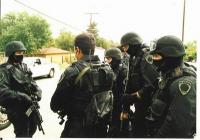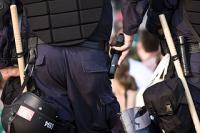-
Husband and wife, identified as San Bernardino attackers, killed in shootout with police

Police shot and killed a husband and wife, both in their late 20s, after the two killed fourteen people and injured seventeen at the Inland Regional Center, a social service center in Sam Bernardino, a working-class community of 200,000 residents about sixty miles east of Los Angeles. The two were identified as Syed Rizwan Farook, 28, and his Tashfeen Malik, 27 (some reports noted that it was not clear whether or not the two had actually married). The couple had a 6-month old daughter.
-
-
U.K. attacks ISIS oil targets in first British military action in Syria

In the first British military strikes in Syria, four British Tornados have dropped precision munitions on seven ISIS targets in eastern Syrian. All of the targets were part of the Islamist organization’s oil production and distribution system. The planes left on their mission from the RAF Akrotiri airbase in Cyprus less than an hour after the House of Commons authorized a U.K. military campaign to destroy ISIS targets in Syria. The United Kingdom has already been part of the U.S.-led coalition against ISIS, but British military strikes were limited to attacking ISIS targets in Iraq.
-
-
45% increase in death by law enforcement in U.S. between 1999 and 2013

Between 1999 and 2013 in the United States, between 279 (in 2000) to 507 (in 2012) people were killed each year by legal intervention or law enforcement, other than by legal execution — a 45 percent increase, mostly among non-whites. In 2013 an estimated 11.3 million arrests in the United States resulted in approximately 480 deaths from legal intervention. Between 1999 and 2013 there were 5,511 deaths by legal intervention.
-
-
Large-scale face-search technology helps in fighting crime, terrorism

The rapid growth in surveillance cameras is resulting in millions of face images and videos captured every day. The ability quickly and accurately to search all these images to assist in identifying criminal and terrorism suspects is an important and complex task that can contribute to making communities safer. To help in this effort, MSU has licensed its large-scale, automatic face-search system to NEC Corp.
-
-
Syria is continuing to use chemical weapons against its people: Diplomats
Diplomats attending the annual meeting of the Organization for the Prohibition of Chemical Weapons (OPCW) in The Hague, on Monday accused Syrian president Bashar al-Assad of continuing to use deadly gas munitions against his own people, although Syria committed to dismantle and remove all of its stocks of chemical weapons. U.S. and EU representatives charged that the regime may still has in its possession large quantities of chemical armaments like sulfur mustard and sarin, which it has concealed from international inspectors.
-
-
NSA’s bulk metadata collection program ends
The NSA on Sunday ended its controversial surveillance program, initiated by the George W. Bush administration in 2006, which collected the metadata of all communications in the United States. The creation of the bulk collection program was the result of criticism by the 9/11 Commission, and many security experts, who argued that the information about the nineteen 9/11 terrorists was available, but that law enforcement and intelligence agencies lacked structure and procedure which would have allowed them to “connect the dots.”
-
-
Israel-Russia communication: Straying Russian plane avoid being shot down

Israel defense minister, Moshe Ya’alon, on Sunday told reporters that a Russian jet recently entered Israeli airspace but was not shot down because Israel and Russia had established an effective open communication system between the two countries. Ya’alon said the plane, by mistake, entered about one mile into Israeli airspace and immediately turned around back to Syria when the Russians were notified.
-
-
Turkey’s, Russia’s official versions of jet shoot down scientifically impossible: Physicists
Two astrophysicists show that the official versions of both Turkey and Russia about the circumstances surrounding the shooting down of a Russian fighter jet over Turkey should be taken with a grain of salt. Turkey’s insists that the Russian jet flew over Turkish territory for 17 seconds, but this is contradicted by the video of the shooting provided by the Turkish military. Russia’s claims that the jet made a 90-dgree turn in order to avoid Turkish airspace does “not correspond to the laws of mechanics.”
-
-
New technique can tell whether a fingerprint belongs to a male or female

Culprits beware: researchers are taking crime scene fingerprint identification to a new level. They have discovered a straightforward concept for identifying whether a culprit is male or female. It is based on the content in fingerprints — specifically amino acids. Amino acid levels in the sweat of females are about twice as high as in males. There is also a slightly different distribution, due mostly to hormonal differences. The same is true for amino acids left behind in fingerprints.
-
-
New sensors detect cable fire before it starts burning
Fires are frequently caused by smoldering cables. New sensors now help detect such smoldering fires at an early stage by analyzing the plastic vapors released by overheated insulating cables. Scientists have developed these hybrid sensors that combine measurement processes with data evaluation. These detect the gases released from the plastic coating due to heating and reliably identify and analyze the gas mixture and its concentration.
-
-
NYPD commissioner to Congress: Do not allow people on terror watch list to buy guns
NYPD Commissioner Bill Bratton the other day called on Congress today to “start getting serious” about fixing the loophole which allows individuals on the U.S. terror watch list legally to purchase firearms in the United States. Bratton said: “If Congress really wants to do something instead of just talking about something, help us out with that terrorist watch list, those thousands of people that can purchase firearms in this country. I’m more worried about them than I am about Syrian refugees.”
-
-
N.Y. State Police app helps citizens report suspicious activity
The New York State Police is urging citizens to download a new digital app which allows citizens to capture and report suspicious activity with their smart phones. The app is part of the “See Something, Send Something” campaign which aims to turn willing citizens into the eyes and ears of law enforcement. For example, if a citizen notices an unattended package at a train station of an airport, they could use the app to alert law enforcement.
-
-
Tech companies: weakening encryption would only help the bad guys
Leading technology companies — Apple, Microsoft, Google, Samsung, Twitter, Facebook, and fifty-six other technology companies — have joined forces to campaign against weakening end-to-end encryption, insisting that any weakening of encryption would be “exploited by the bad guys.” Apple’s chief executive Tim Cook recently asserted that “any backdoor is a backdoor for everyone.”
-
-
After Paris, it’s traditional detective work that will keep us safe, not mass surveillance
Before the dust has even settled from the attacks on Paris, familiar calls for greater surveillance powers are surfacing. The desire for greater security is understandable, but that doesn’t mean we should suspend our judgement on the measures proposed to bring it about. It’s widely accepted that intelligence work is the most effective form of counter-terrorism, and that the best intelligence comes from community engagement, not coercion. So we must be wary of the evangelism of those pushing technological solutions to security problems, and the political clamor for mass surveillance.
-
-
ISIS “trying to obtain chemical, nuclear weapons”: U.K. government
British prime minister David Cameron said yesterday that the government security review has warned that ISIS and al-Qaeda are trying to get their hands on chemical and nuclear weapons. Cameroon referred to the security review in a speech in which he called on Members of Parliament to approve U.K. air strikes in Syria within a week. The British government pledged allocation additional resources for new equipment and the creation of within the Army of two new rapid response “strike brigades” of 5,000 soldiers each. The number of civilian jobs in the Ministry of defense, though, will be heavily reduced.
-
More headlines
The long view
Factories First: Winning the Drone War Before It Starts
Wars are won by factories before they are won on the battlefield,Martin C. Feldmann writes, noting that the United States lacks the manufacturing depth for the coming drone age. Rectifying this situation “will take far more than procurement tweaks,” Feldmann writes. “It demands a national-level, wartime-scale industrial mobilization.”
How Male Grievance Fuels Radicalization and Extremist Violence
Social extremism is evolving in reach and form. While traditional racial supremacy ideologies remain, contemporary movements are now often fueled by something more personal and emotionally resonant: male grievance.
The Surprising Reasons Floods and Other Disasters Are Deadlier at Night
It’s not just that it’s dark and people are asleep. Urban sprawl, confirmation bias, and other factors can play a role.
Why Flash Flood Warnings Will Continue to Go Unheeded
Experts say local education and community support are key to conveying risk.
